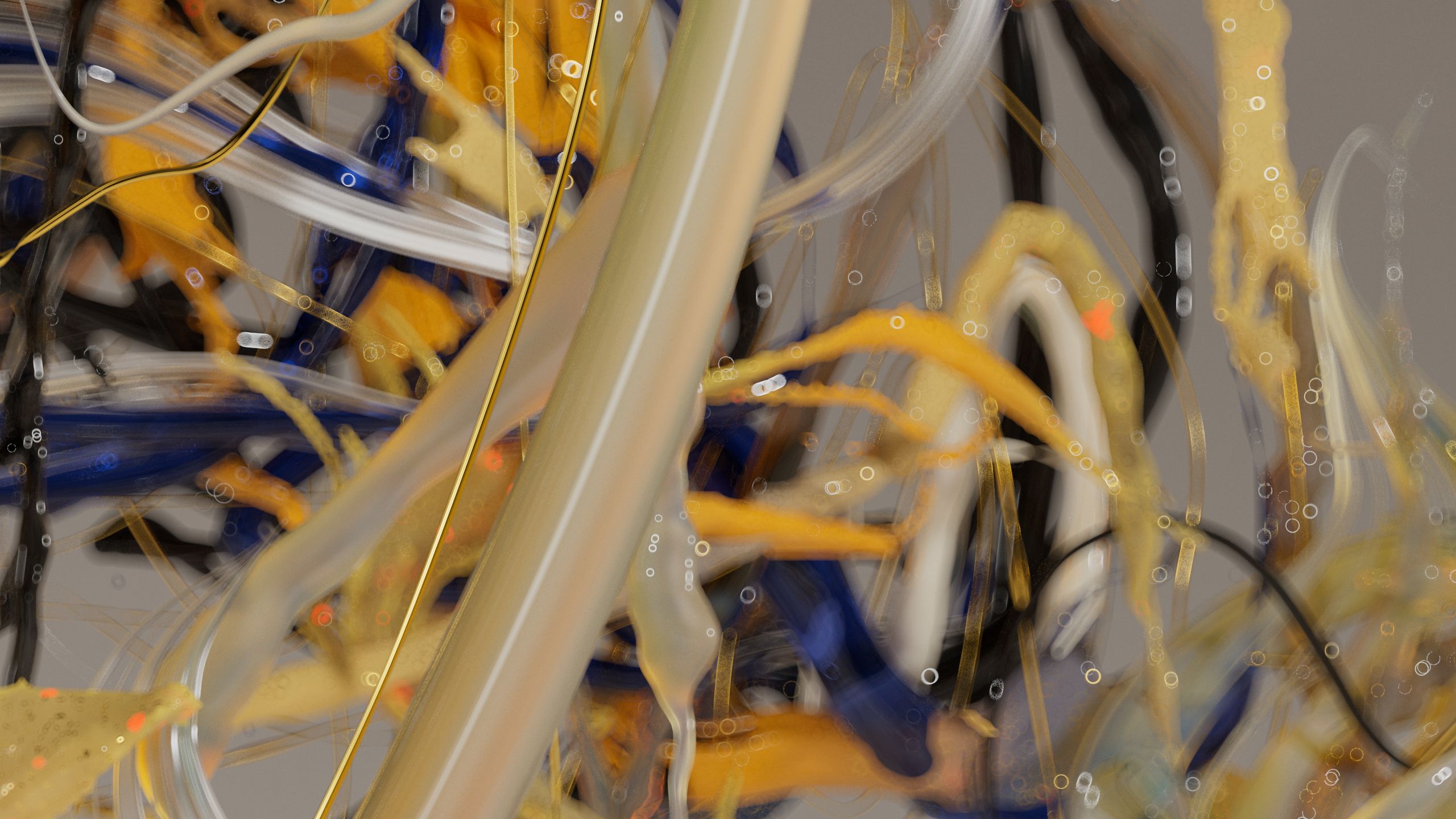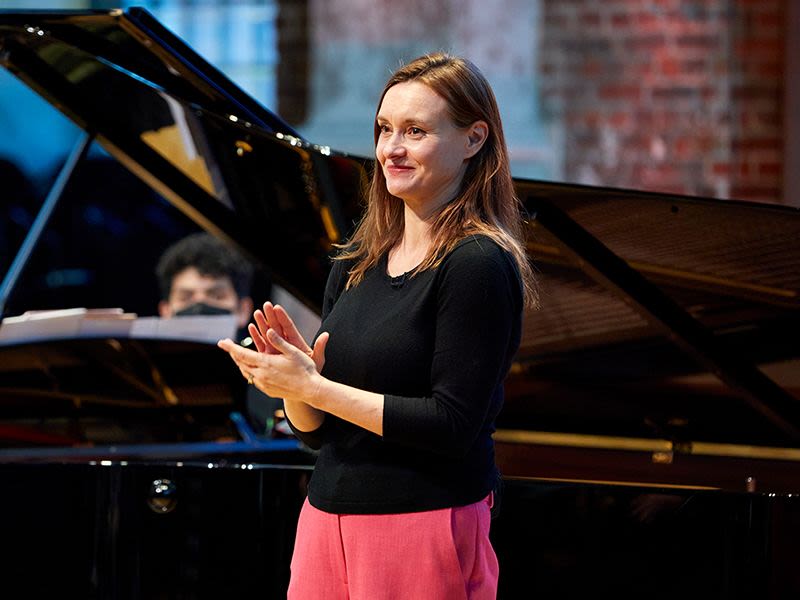LSO Discovery
Friday Lunchtime Concert
Friday 23 September 2022
12.30pm

TODAY'S CONCERT
Max Bruch Allegro from Serenade on Swedish Folk Melodies
Grażyna Bacewicz Andante from String Quartet No 4
Astor Piazzolla J'attends and Adios Nonino from 'Five Tangos for Violin and Double Bass'
Wolfgang Amadeus Mozart Allegro from String Quintet in E-flat
Johann Jr & Josef Strauss Pizzicato Polka
Mitzi Gardner violin
June Lee violin
Yuriko Matsuda violin
Joonas Pekonen violin
Annie-May Page viola
Hannah Roberts viola
Silvestrs Kalniņš cello
Pingping Zhang cello
Yat Hei Lee double bass
Rachel Leach presenter
Robert Turner concert curator & coach
Eve-Marie Caravassilis coach
USING YOUR DIGITAL PROGRAMME
- Connect to the free hawksmoor WiFi network.
- Navigate using the menu icon (≡) at the top of the screen.
- Please set your phone to silent and don't use other apps during the music.
The LSO String Experience Scheme is generously supported by the Idlewild Trust, Thriplow Charitable Trust, Barbara Whatmore Charitable Trust and Thistle Trust.
Max Bruch (1838 to 1920)
Serenade on Swedish Folk Melodies
✒️ 1916* | ⏰3 minutes
*published posthumously

Max Bruch was a German composer in the Romantic tradition of Robert Schumann and Johannes Brahms. He is now best known for his Violin Concerto of 1866, which is still one of the most popular violin concertos. However, this fact probably wouldn’t make Bruch happy! Towards the end of his life he was increasingly annoyed by the attention lavished on this one piece especially as he had been conned out of receiving any royalties for it.
He was struggling financially, in ill health and troubled by the direction music was taking – a direction far away from his lush Romantic sound. Despite this bitterness he became fascinated by folk music and created several lucrative collections of traditional Russian and Swedish tunes for various instrumentations. This Serenade was reconstructed long after his death (and published in 1997) using fragments of movements found on his desk. We will hear the third movement today, a dance from a historical region of central Sweden called Dalarna.
Note by Rachel Leach
Grażyna Bacewicz (1909 to 1969)
String Quartet No 4
✒️ 1951 | ⏰6 minutes

Prolific Polish composer Grażyna Bacewicz was born into a musical family in Łódź. Bacewicz received her first lessons on violin and piano from her father. She studied at the Warsaw Conservatoire, graduating in 1932 as violinist and composer and then travelled to France to study with the great Nadia Boulanger.
During World War II, concerts and composing were banned in Warsaw but Bacewicz continued in secret. To the wider world she was ‘just’ a wife and mother but to a select few she was a vital part of the underground arts scene, composing, performing, and organising illegal concerts. This quartet from 1951 was commissioned by the Polish Composers’ Union and won an International String Quartet Prize. The second movement is at times weird and wandering, at other times intense but always lovely.
Note by Rachel Leach
Astor Piazzolla (1921 to 1992)
Five Tangos for Violin and Double Bass
✒️ arr Andres Weibecke-Gottstein, 2000 | ⏰8 minutes

Astor Piazzolla was an Argentine tango composer and performer. He was born in Buenos Aires but brought up in New York City where he began to learn the bandoneon on the urging of his homesick father. As an adult he returned to Argentina and made a living by playing in tango bars during the night and writing ‘classical’ music during the day. Eventually he combined these two musical loves and created nuevo tango. He is now known as the ‘world’s foremost composer of tango’.
These two movements are from a collection arranged for bass and violin by bassist Andres Weibecke-Gottstein. Piazzolla wrote ‘Adios Nonino’ (farewell grandaddy) after hearing of the unexpected death of his father. He was in New York and homesick. The piece is now a symbol of the Argentine diaspora.
Note by Rachel Leach
Wolfgang Amadeus Mozart (1756 to 1791)
String Quintet in E-flat
✒️ 1791 | ⏰5 minutes

Wolfgang Amadeus Mozart began composing at age five, was famous around Europe by the age of eight and, by his death at age 35, had displayed genius in everything he wrote. As an adult, Mozart initially found it difficult to secure a post as a court composer largely because of his ‘celebrity’ status as a child prodigy, as well as believing that the many offers he received were beneath his considerable talents.
Mozart eventually settled on a post in Vienna where he was the centre of European music but his life was never far from controversy. He and his wife had lavish tastes and spent well beyond their means. He died penniless, leaving behind some of the greatest works of the Classical period. This quintet was completed in the last year of his life and is his last substantial chamber work. It is scored for string quartet with additional viola. This movement is light and witty with a simple ‘rustic’ theme.
Note by Rachel Leach
Johann Jr (1825 to 1899) & Josef Strauss (1827 to 1870)
Pizzicato Polka
✒️ 1869 | ⏰3 minutes

Johann Strauss Senior (the father), Eduard, Josef and Johann Junior were a family of great composers who were at the centre of the Viennese Waltz craze and in demand all over Europe throughout the second half of the 19th century. Johann Jr was so famous and prolific that he was known as the ‘Waltz King’. He changed the waltz from a simple peasant dance into a luxurious, opulent form of entertainment and soon all the richest people were playing his pieces at their parties and balls. Pizzicato Polka was written by Johann Jr and Josef for a visit to Russia. It was an instant success and has become so beloved and famous that it is almost always included in Strauss concerts (despite not being a waltz!). It was originally scored for plucked strings and glockenspiel.
Note by Rachel Leach
About the Artists

Rachel Leach
presenter

Rachel Leach was born in Sheffield. She studied composition with Simon Bainbridge, Robert Saxton and Louis Andreissen. Her music has been recorded by NMC and published by Faber. She has won several awards including, with ETO, the RPS award for best education project 2009 for One Day, Two Dawns.
Rachel has worked within the education departments of most of the UK’s orchestras and opera companies. The majority of her work is for the London Symphony Orchestra and the London Philharmonic Orchestra. Rachel has written well over 20 pieces for LSO Discovery and 15 community operas, including seven for ETO.
Alongside this she is increasingly in demand as a concert presenter. She is the presenter of the LSO St Luke's lunchtime concert series and regularly presents children’s concerts and pre-concert events for the LSO, LPO, Philharmonia Orchestra, Scottish Chamber Orchestra, Royal College of Music and Royal Northern Sinfonia.
In Spring 2013 Rachel was awarded Honorary Membership of the RCM in recognition of her education work.

About the LSO String Experience Scheme

Established in 1992, the LSO String Experience scheme enables young string players at the start of their professional careers to gain work experience by playing in rehearsals and concerts with the LSO. Currently, more than 15 members of the LSO came to the Orchestra via the scheme.
The scheme auditions students from the London music conservatoires – Royal Academy of Music, Royal College of Music, Guildhall School of Music & Drama, and Trinity Laban College of Music and Dance – and 10 students per year are selected to participate in the scheme. Participants are treated as professional 'extra' players (additional to LSO members) and receive fees for their work in line with LSO section players. They are given other opportunities during their year on the scheme, including tickets to LSO concerts, exploring string orchestra repertoire side-by-side with LSO players, and chamber music coaching. The participants are guided throughout the year by the five LSO mentors – Maxine Kwok and Iwona Muszynska (violins), Robert Turner (viola), Eve-Marie Caravassilis (cello) and Tom Goodman (double bass).
Auditions for the 2022/23 scheme will take place in November. For further details, check the LSO website or contact Alice Manning (alice.manning@lso.co.uk).
LSO String Experience Scheme 2021/22
Violins
Mitzi Gardner (Royal Academy of Music)
June Lee (Royal College of Music)
Joonas Pekonen (Guildhall School)
Yuriko Matsuda (Guildhall School)
Violas
Annie-May Page (Royal Academy of Music)
Sally Belcher (Guildhall School)
Cellos
Pingping Zhang (Royal Academy of Music)
Silvestrs Kalniņš (Royal College of Music)
Double basses
Yat Hei Lee (Guildhall School)
Lon Fon Law (Royal Academy of Music)
Next Friday Lunchtime Concert

Friday 14 October 12.30pm
Clarence Cameron White Levee Dance
Amy Beach Romance
Josef Suk Four Pieces for Violin and Piano
Carmine Lauri violin
Francesca Lauri piano
Rachel Leach presenter

